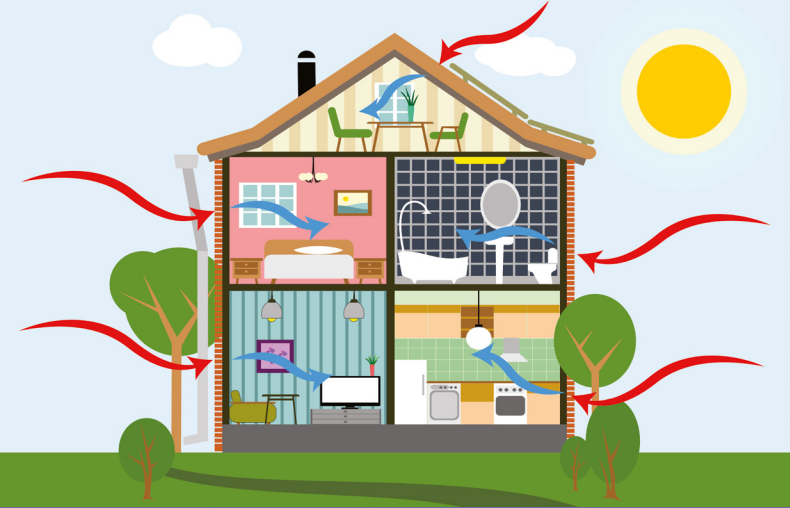
Unlocking Sustainability: Energy-Efficient Home Designs
As our world grapples with the challenges of climate change, the importance of sustainable living has never been more apparent. Energy-efficient home designs play a pivotal role in creating residences that are not only comfortable but also environmentally friendly. Let’s explore the key elements that make these designs essential in the realm of modern housing.
Smart Architecture for Efficient Living
Energy-efficient home designs start with smart architecture. This involves strategically placing windows to maximize natural light and ventilation, reducing the need for artificial lighting and excessive air conditioning. Additionally, well-insulated walls and roofs contribute to maintaining a comfortable temperature indoors, minimizing the reliance on heating and cooling systems.
Innovative Materials and Construction Techniques
The use of innovative materials and construction techniques is a cornerstone of energy-efficient home designs. High-quality insulation materials, such as recycled foam or natural fibers, help regulate temperature effectively. Furthermore, the adoption of construction methods like insulated concrete forms (ICFs) enhances the structural integrity of homes while improving energy efficiency.
Integrated Renewable Energy Systems
To truly embrace energy efficiency, homes are now being designed with integrated renewable energy systems. Solar panels, wind turbines, and geothermal heating systems are among the technologies employed to harness natural resources and generate clean energy. These systems not only reduce reliance on traditional power sources but also contribute to a more sustainable way of living.
Energy-Efficient Appliances and Fixtures
A holistic approach to energy efficiency extends beyond the construction phase. Energy-efficient home designs incorporate appliances and fixtures that are designed to consume minimal energy. From LED lighting to high-efficiency HVAC systems, these features not only lower energy consumption but also contribute to long-term cost savings for homeowners.
Smart Home Automation for Optimal Resource Management
The advent of smart home automation has revolutionized the way we manage energy in our homes. Energy-efficient designs now often include smart thermostats, lighting controls, and automated shading systems. These technologies enable homeowners to optimize energy usage based on their daily routines, ultimately leading to more efficient resource management.
Creating Healthy Indoor Environments
Beyond energy conservation, energy-efficient home designs prioritize creating healthy indoor environments. This involves using low-emission materials for construction and incorporating efficient ventilation systems to maintain high indoor air quality. The result is not just an energy-efficient home but a space that promotes the well-being of its occupants.
Financial Incentives for Energy-Efficient Homes
Governments and environmental agencies worldwide are recognizing the importance of energy-efficient homes. Many offer financial incentives, tax credits, or subsidies to homeowners who choose sustainable building practices. These incentives not only make energy-efficient designs more accessible but also encourage a broader shift towards eco-friendly living.
Community and Environmental Impact
The adoption of energy-efficient home designs goes beyond individual benefits; it positively impacts communities and the environment. Reduced energy consumption contributes to lower carbon footprints, mitigating the overall environmental impact of residential areas. Additionally, as more homes embrace sustainable practices, communities collectively move towards a greener and more sustainable future.
The Future of Housing: Energy-Efficiency as a Standard
As awareness of environmental issues grows, the demand for energy-efficient homes is on the rise. Forward-thinking developers and architects are increasingly making energy efficiency a standard rather than an option. This shift indicates a positive trajectory for the housing industry, emphasizing a commitment to sustainable living practices.
Exploring Energy-Efficient Home Designs at WaslInfo.org
If you are intrigued by the idea of energy-efficient home designs and want to explore further, visit WaslInfo.org. Discover valuable insights, resources, and inspiration to embark on your journey towards a more sustainable and energy-efficient living space.
In conclusion, energy-efficient home designs represent a significant step towards a more sustainable and eco-friendly future. From smart architecture to integrated renewable energy systems, these designs offer a holistic approach to modern living. As the housing industry continues to evolve, prioritizing energy efficiency is not just a choice but a responsibility towards creating a better and more sustainable world.
